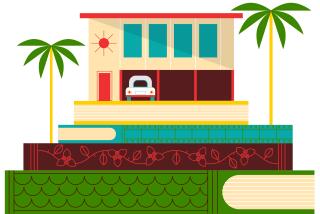The last few chapters
- Share via
Dahlia FINGER needs help. That’s what Danny, her cruel and sort of creepy brother, tells her to bring their phone conversations to a close. And though it’s just a passive-aggressive zinger to punish her for calling in the first place, a few pages into Elisa Albert’s darkly comic first novel, “The Book of Dahlia,” you figure out that Danny’s right.
At 29, Dahlia is a TV-addicted, aimless idler, just marking time in the cute Venice bungalow her father bought for her. She’s a connoisseur of pot and pop culture; she can make a pretty good mix-tape and will sleep with any guy who oohs and ahs over her baby pictures.
In true slacker fashion, Dahlia parlayed her undergrad degree from Boston University into a career as a New York bartender. When that bottomed out, her rich and loving daddy rescued Dahlia and brought her home to L.A. Now, she’s “living her life isometrically: action with no movement.”
No movement, that is, until she has a grand mal seizure. An MRI scan reveals an inoperable brain tumor; Dahlia is told she has just months to live. Her cancer launches her parents -- Bruce and Margalit, separated years ago but never divorced -- into a depressing campaign to pry hope from even the most dire of prognoses. When an internist says that most brain tumors like Dahlia’s aren’t curable, “Margalit and Bruce, united in chorus for days thereafter: ‘Most!’ He didn’t say none! He only said ‘Most!’ ”
A trip to a local bookstore’s cancer section pushes Dahlia and her parents even further along their different paths. Bruce and Margalit buy armloads of self-help books that peddle hope and herbs. Dahlia chooses “It’s Up to You: Your Cancer To-Do List.” Instead of a cure or even any answers, it promises to help Dahlia “assimilate this shocking turn of events.”
The list book’s chapter headings (“The Bright Side,” “Live Now”) become the novel’s chapter headings. Its patronizing pronouncements become epigraphs: “Decide that you are going to overcome this illness. Decide you are going to live a long and happy life. It’s just that simple.”
The author, whose relish for poking fun and puncturing stereotypes ran through her previous short-story collection, “How This Night Is Different,” uses Dahlia’s predicament in the same way. Here Dahlia is describing the support group her parents have railroaded her into attending, supposedly to bond and gain comfort:
“Ovarian Carol, Ruth Ann and Carlotta passed out pictures of their grandchildren and wept at the possibility of not seeing them grow but offered thanks to God for the time they did have. Silver-haired lung-Arlene and double-mastectomy-Francine reported symptoms and the next steps in treatment with a steely reserve and a kind of endearing, understandable, appalled disbelief that this was actually happening to them. Compact, fortysomething testicular-Bart, the only male, said he wanted to ‘Beat this thing,’ which was funny, since he was talking about his genitals.”
Even with a fatal disease, Dahlia’s a slacker. She won’t research her treatment, doesn’t want a second opinion, can’t pay attention when the doctors talk. Well, that’s not exactly true. When the doctor urges her to smoke pot, Dahlia gladly obeys. She’s deep in denial and only the brutal side effects of the chemotherapy (and the more brutal fact that it’s not helping) link her to reality.
It’s always interesting to see how a short-story writer makes the leap to the long form. What we get in “The Book of Dahlia” is a story that somehow feels mushy. Albert tells us things, then tells them again and again. Different settings, same conclusion. Dahlia is precocious. Dahlia’s mother is a narcissist. Dahlia’s brother is a bit of a sociopath. Her father’s both a sweetheart and a loser. It’s as though without the membrane that separates one short story from the next, Albert is at a loss for organization.
There’s a sense of guilty relief when Dahlia starts to fail. Our heroine really is sick, but the story is getting stronger. Albert focuses and brings “The Book of Dahlia” to a sweet and poignant close.
Is Dahlia’s wasted life a waste of life? Maybe. But the time we spend with her isn’t.
More to Read
Sign up for our Book Club newsletter
Get the latest news, events and more from the Los Angeles Times Book Club, and help us get L.A. reading and talking.
You may occasionally receive promotional content from the Los Angeles Times.








